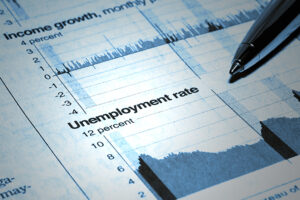China is driving stock markets today. Inflation from Germany in the spotlight
After such a positive start to the year, with two consecutive monthly gains, European markets performed remarkably well against the backdrop of a surge in interest rates. On the other hand, US markets closed lower and gave back some of their January gains.
Since the beginning of the year DAX increased by 10,3%, and FTSE100 by 5,7% against the backdrop of a sharp rise in interest rates in Germany and the UK and stronger than expected inflationary pressure.
These gains have inevitably sparked speculation about their durability, and so far the progress we're seeing seems to be sustainable. A lot will depend on how high rates end up being, and there are many opinions on this.
Markets continue to price in the prospect of rates eventually falling to a lower baseline, and few investors are willing to accept the idea that rates are likely to remain high for some time, if not longer. Much will depend on how high inflation will be, and current data shows that there is little indication of its slowdown, which means that in the coming months we may see at least 2-3 more rate hikes, and rates may stay at these levels through 2024 and 2025
The market awaits PMI data from Europe
Today's final manufacturing PMIs from Spain, Italy, France, Germany and the UK are expected to point to a mixed outlook for economic activity, with manufacturing expected to improve to 49 and 51 in Spain and Italy, and fall to 47,5 and 46,3 respectively in France and Germany.
Yesterday, inflation in France reached a record high of 7,2% in February, driven by rising food and services prices, while in Spain it rose to 6,1%. While we see a slowdown in energy prices, which generally helps the manufacturing sector, reactions to a milder winter have been mixed. Italy and Spain appear more resilient, but France and Germany appear to be heading in the wrong direction.
One of the reasons for this is higher inflation - today's German CPI for February is expected to fall only slightly to 9% from 9,2%, but there is a risk of a positive surprise given yesterday's readings from Spain and France. The sticky inflation outlook is already shifting expectations for rate hikes by EBC and a possible 4% pause.
We also have more economic data from the UK, where consumers are similarly squeezed by higher prices and some shortages. Confirmation is pending UK manufacturing PMI at 49,2, up from 47.
Mortgage approvals are also on a downward trend amid a slowing economy and falling home prices. At the end of last year, the number of approvals fell to the lowest level since May 2020 and amounted to 35,6 thousand. and in January there may be a slight increase to 38,5 thousand.
Net consumer credit has slowed from the level seen in the summer, falling to £500m at the end of last year. There could be a slight increase to £800m in January.
The macro situation in the US
Moving on to the US economy, we have a manufacturing ISM that will set us up well for Friday's services report, which helped to reinforce the hawkish tone we saw after the January payrolls.
Manufacturing ISM is forecast to improve slightly to 48 while still in a downward phase, with prices paid currently disinflating at 44,5.
European markets may start the new month on a positive note after Asian markets received a positive signal from China's latest manufacturing and services PMI data for February, which saw manufacturing activity jump to its highest level since 2012 at 52,6. XNUMX.
The services sector also saw an increase to 56,3, bringing China's reopening story to a new height after a slow start since restrictions were eased in December.






















![Forex Club – Tax 9 – Settle tax on a foreign broker [Download the Application] Forex Club - Tax 9](https://forexclub.pl/wp-content/uploads/2024/02/Forex-Club-Podatek-9-184x120.jpg?v=1709046278)
![Trading View platform – solutions tailored to the needs of traders [Review] trading view review](https://forexclub.pl/wp-content/uploads/2024/03/trading-view-recenzja-184x120.jpg?v=1709558918)
![How to connect your FP Markets account to the Trading View platform [Guide] fp markets trading view](https://forexclub.pl/wp-content/uploads/2024/02/fp-markets-trading-view-184x120.jpg?v=1708677291)
![How to invest in ChatGPT and AI? Stocks and ETFs [Guide] how to invest in chatgpt and artificial intelligence](https://forexclub.pl/wp-content/uploads/2023/02/jak-inwestowac-w-chatgpt-i-sztuczna-inteligencje-184x120.jpg?v=1676364263)


![WeWork – the anatomy of the collapse of a company valued at $47 billion [WeWork, part II] wework bankruptcy story](https://forexclub.pl/wp-content/uploads/2024/04/wework-bankructwo-historia-184x120.jpg?v=1711729561)
![Adam Neumann – the man who screwed up Softbank [WeWork, part AND] adam neumann wework](https://forexclub.pl/wp-content/uploads/2024/04/adam-neumann-wework-184x120.jpg?v=1711728724)





![How to transfer shares to another brokerage office [Procedure description] how to transfer shares to another brokerage house](https://forexclub.pl/wp-content/uploads/2024/03/jak-przeniesc-akcje-do-innego-biura-maklerskiego-184x120.jpg?v=1709556924)

![The most common mistakes of a beginner trader - Mr Yogi [VIDEO] Scalping - The most common mistakes of a beginner trader - VIDEO](https://forexclub.pl/wp-content/uploads/2024/03/Scalping-Najczestsze-bledy-poczatkujacego-tradera-VIDEO-184x120.jpg?v=1711601376)
![Learning patience: No position is also a position - Mr Yogi [VIDEO] Scalping - Learning patience - No position is also a position - VIDEO](https://forexclub.pl/wp-content/uploads/2024/03/Scalping-Nauka-cierpliwosci-Brak-pozycji-to-tez-pozycja-VIDEO-184x120.jpg?v=1710999249)
![When to exit a position and how to minimize losses - Mr Yogi [VIDEO] Scalping - When to exit a position and how to minimize losses - VIDEO](https://forexclub.pl/wp-content/uploads/2024/03/Scalping-Kiedy-wyjsc-z-pozycji-i-jak-minimalizowac-straty-VIDEO-184x120.jpg?v=1710336731)

















